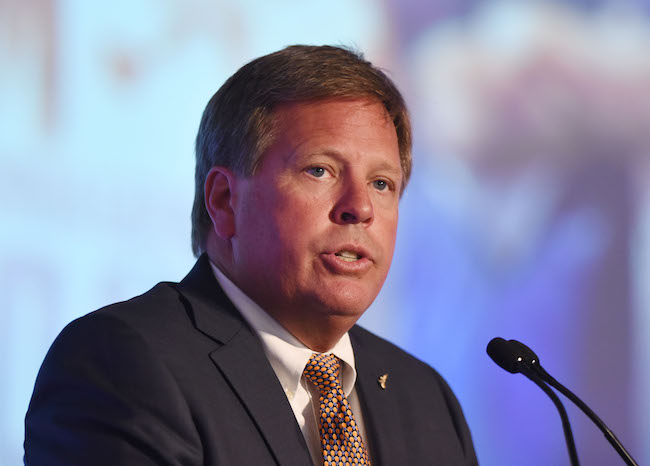
The Jim McElwain era has arrived at Florida
Check out all the interviews Jim McElwain did following his hiring as Florida’s new football coach last December.
You’ll probably note that they sound similar. He referenced the same key concepts throughout: time-honored coaching tenets such as building a foundation, playing with a sense of urgency and being consistent in daily routines.
But they’re considerably more to McElwain than just empty platitudes. They’re his own personal bedrocks, ones given to him while coming up in a blue-collar background in Montana that eventually led him into coaching college football.
The formula has worked wherever McElwain has gone, dating back to his days as the gifted coordinator who masterminded the two Alabama offenses that won national championships under venerable coach Nick Saban. Sure, there was no shortage of NFL-bound talent among the Crimson Tide, but McElwain succeeded in getting all of the team’s many former prized recruits to buy everything he was selling.
As a result, Alabama consistently played to its full potential during his tenure there to become the program to which all others are now measured.
McElwain would later do likewise during his first head coaching job at Colorado State, turning a moribund program into a winner that could put points on the board in a hurry in three short years. He was honored as last year’s Mountain West Conference Coach of the Year.
Gators fans are hoping to see a similar football renaissance in Gainesville, where McElwain is charged with reviving a proud program that has struggled in recent years, on offense in particular. But he’s always been quick to temper expectations because McElwain knows all too well that rebuilding jobs of this sort don’t happen overnight.
It requires a change in culture, and that doesn’t always come easily. That much has already become obvious to McElwain as he prepares for his first game along the Gators sidelines on Saturday evening when New Mexico State visits The Swamp.
Making players understand that they must compete on every play with the same intensity has been chief among his goals. Florida is hardly lacking talent, but its execution especially on offense in recent years has been suspect.
Attention to detail is paramount to McElwain, a fact that he has repeatedly stressed to quarterbacks Treon Harris and Will Grier as they competed for the starting job beginning this spring. It’s the little things like making quicker pre-snap reads, consistently getting the ball out of their hands to playmakers and avoiding sacks in the red zone at all costs that determine whether a team is a great one or not.
It’s the job of McElwain and his staff to always gauge the cards they’ve been dealt and put their players into the positions that give them the best chance of success. But the onus is on the players to hone the critical skills they need during the week. You usually play on Saturdays, McElwain is quick to note, as you practice.
Everybody has to buy in and do their part, coaches included, if change is to take place. History suggests that he might know a little something about which he’s talking.
Just thinking you’re “The Mighty Gators” doesn’t do it, either on the field or in the cut-throat world of recruiting. That’s why McElwain has charged into that crucial area with the same competitive zeal he brings to the field every day.
McElwain is not so arrogant as to think that he’s magically re-invented the wheel and is doing things never done before. No, like any good coach, he’s taken something from everywhere he’s been and weaved it into a coaching formula that best works for him.
He likened himself at his introductory press conference to a mutt that’s been dropped off the Humane Society because, like that dog, he, too, has a little bit of every breed in him.
Florida athletics director Jeremy Foley was sold on McElwain almost immediately.
And it worked out pretty good for Florida the last time they brought in an offensive-minded guru with McElwain’s reputation and handed him the keys to the kingdom.
His name was Steve Spurrier.
